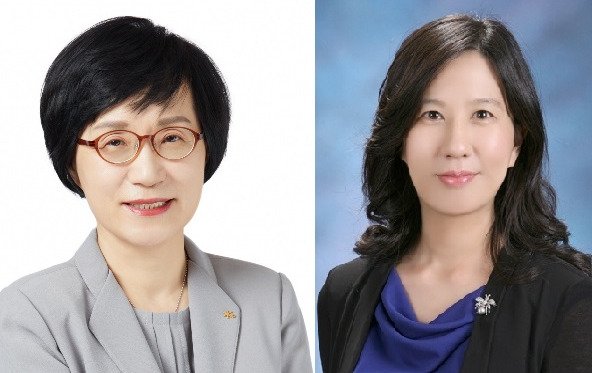More women break glass ceiling on financial group boards
By Park Han-naPublished : April 1, 2024 - 15:39

South Korean financial groups have undergone a transition in their board composition, indicating governance changes centering on gender diversity and internal control.
Given that a financial holding company’s board is the ultimate decision-making body engaging in establishing management strategies and budget planning for itself and its affiliated banking and securities units, the changes give a glimpse of the future direction that the groups are pursuing.
Here are the key takeaways from recent boardroom shakeups and the implications behind them.
More women break glass ceiling
Following shareholders‘ meetings held in March, the number of female board directors at Korea’s four major bank holding companies – KB Financial Group, Shinhan Financial Group, Hana Financial Group and Woori Financial Group -- increased to 10 from seven last year. Women now constitute 31.3 percent of independent directors appointed by the four conglomerates, compared with 23.3 percent last year.
KB Financial Group made a significant change in board composition by appointing an outside director Kwon Seon-joo as the chair of the board.
This marks the first since the group‘s founding that a female chair of the board has been elected.
As a banking professional with over 40 years of experience, Kwon started her career in banking at the state-owned Industrial Bank of Korea in 1978 and became the CEO of the lender, winning the title of Korea‘s first female bank CEO. She has a broad range of experience in the banking sector, from foreign exchange and credit card business to consumer protection.
Currently, she also serves as the head of the Korean chapter of Women Corporate Directors, the world‘s largest membership organization for female corporate board directors.
“The birth of a female board chair will greatly contribute to the advancement of KB Financial Group‘s governance structure and the expansion of board diversity,” the group said.
Since 2023, three board seats out of nine at KB Financial Group have been held by women. According to data provider Statista, 63.7 percent of listed Korean companies did not have women on boards as of 2021.
Shinhan Financial Group has also appointed a female board chair for the first time in 14 years.
Yoon Jae-won, who currently serves as a professor at Hongik University Business School, was elected to lead the group’s board committee at the general shareholders’ meeting held on Tuesday.
Yoon is expected to support Shinhan‘s financial decisions with her specialty in accounting and tax. She is also vice chair of the Korean Academic Society of Taxation.
Including Yoon, three board seats out of nine went to women at Shinhan Financial Group.
Hana Financial Group added Yoon Shim, former senior vice president of Samsung SDS, to the board, increasing the female director number from one to two.
The push for gender diversification in boardrooms came after the country’s financial watchdog, the Financial Supervisory Service, recommended doing so in December, based on the ratio of female directors at major global investment banks -- 53.8 percent at Citigroup, 38.5 percent at Wells Fargo and 35.7 percent at Bank of America.
In 2022, a revision to the Financial Investment Services and Capital Markets Act went into effect, mandating the appointment of at least one female director in listed corporations with total assets exceeding 2 trillion won ($1.48 billion), also propelling the trend.
“Although these moves were triggered by the enforcement of the law, increasing women‘s representation would bring a fresh and different perspective to boardrooms that have long been dominated by male-centered culture,” said Yoon So-jeong, a senior researcher at the Korea Institute of Corporate Governance and Sustainability.
Power consolidation, separation
Hana Financial Group has sought to strengthen internal control by adding two more executive directors -- Hana Bank CEO Lee Seung-lyul and Hana Securities CEO Kang Seong-muk – to its boardroom. Group Chairman Ham Young-joo has been serving as the sole executive director since March 2022.
The decision was made to “strengthen the responsibility and accountability of board members for the effectiveness of internal control and risk management procedures,” according to a group official.
The reconstitution of the board of directors reflects the Financial Supervisory Service’s direction, in which financial groups and banking firms prepare an emergency succession plan to prevent a management void in the event of the absence of top executives.
Hana‘s chair has been embroiled in a couple of legal suits involving its banking unit’s misspelling of derivative-linked funds and a recruitment scandal.
Bringing two top executives of subsidiaries onto the board is an unusual move. Other financial conglomerates that hold banking arms have their chairs as executive directors and bank CEOs as non-executive directors on the board.
Unlike the other four major financial groups, Woori Bank CEO Cho Byung-kyu did not get a seat on the board of Woori Financial Group.
As the group decided to leave its non-executive director position vacant, the boardroom was filled with Chairman Yim Jong-yong serving as the only executive director and other seven independent directors.
The decision is in line with Yim’s management principles that the holding company ought to focus on formulating strategies while subsidiaries such as banks ought to revolve around sales.
Typically, the head of a bank, which is a core affiliate of financial groups, has served as a registered director of a holding company. Currently, KB Kookmin Bank CEO Lee Jae-keun and Shinhan Bank CEO Jung Sang-hyuk are also serving as non-executive directors of their respective financial groups.




![[KH Explains] No more 'Michael' at Kakao Games](http://res.heraldm.com/phpwas/restmb_idxmake.php?idx=644&simg=/content/image/2024/04/28/20240428050183_0.jpg&u=20240428180321)




![[Grace Kao] Hybe vs. Ador: Inspiration, imitation and plagiarism](http://res.heraldm.com/phpwas/restmb_idxmake.php?idx=644&simg=/content/image/2024/04/28/20240428050220_0.jpg&u=)









